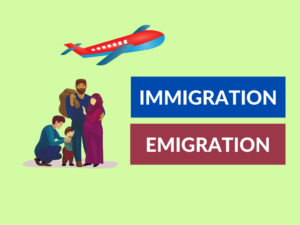Emigrant vs Immigrant: Understanding the Differences
What is an Emigrant?
An emigrant is an individual who leaves their own country to settle in another. They choose to leave their homeland for various reasons, such as seeking better economic opportunities, escaping political unrest, or joining family members who have already migrated.
Examples of Emigrants:
1. John left Ireland and moved to the United States to find a job.
2. Maria emigrated from Brazil to Spain for a higher education opportunity.
Uses of Emigrants:
1. Emigrants contribute to the labor force in host countries, enhancing economic growth.
2. They often send remittances back to their home countries, supporting their families financially.
3. Emigrants can bring new ideas, cultures, and perspectives to their destination countries, enriching society.
What is an Immigrant?
An immigrant is a person who comes to a foreign country with the intention of permanently settling there. Immigrants are driven by various factors, including economic prospects, political stability, and the desire for a better quality of life.
Examples of Immigrants:
1. Ahmed moved from Syria to Germany to escape the ongoing conflict.
2. Anna immigrated from Russia to Canada in search of better job opportunities.
Uses of Immigrants:
1. Immigrants contribute to the cultural diversity and societal development of their host countries.
2. They fill labor market gaps and bring valuable skills that benefit the economy.
3. Immigrants often start businesses and contribute to innovation and entrepreneurship.
Differences between Emigrants and Immigrants:
| Difference Area | Emigrants | Immigrants |
|---|---|---|
| Motivation | Seeking better economic opportunities, escaping political unrest or joining family members abroad. | Looking for permanent settlement, better quality of life, economic prospects, or political stability. |
| Duration | Emigration is typically temporary or for a specific period. | Immigrants plan to settle permanently in their destination country. |
| Legal Status | Emigrants may require visas, work permits, or other legal documents based on the host country’s regulations. | Immigrants need to obtain legal permission, such as visas, to reside in the destination country. |
| Integration | Emigrants might retain strong cultural ties with their home country and may not fully integrate into the new society. | Immigrants often strive to integrate into the new society, learn the language, and adopt local customs. |
| Purpose | Emigration is driven by specific reasons like employment, education, or family reunion. | Immigration involves seeking long-term settlement and a better quality of life. |
| Impact on Home Country | Emigration may lead to a brain drain and loss of skilled workforce in the home country. | Immigration can result in a reduced working-age population and affect the economy of the home country. |
| Impact on Host Country | Emigrants can contribute to the host country’s economy through temporary employment and remittances. | Immigrants bring diverse skills, cultural enrichment, and contribute to economic growth. |
| Settlement Intention | Emigrants may plan to return to their home country after achieving their specific goals. | Immigrants intend to permanently settle and build a new life in the destination country. |
| Perception | Emigrants may face stigmatization or attitudes that question their loyalty to their home country. | Immigrants can face challenges related to cultural assimilation, discrimination, or xenophobia. |
| Legal Framework | Emigration policies are usually less stringent than immigration policies. | Immigration policies determine the entry and settlement requirements for immigrants. |
Conclusion:
In summary, emigrants are individuals who leave their home country temporarily, seeking various opportunities. On the other hand, immigrants are those who permanently settle in a foreign country, contributing to its cultural diversity, economy, and societal development. While emigrants may have specific goals and eventually return to their home country, immigrants strive to integrate into the new society and build a new life.
Knowledge Check:
1. What is the main difference between emigrants and immigrants?
Answer: Emigrants leave their home country temporarily, while immigrants aim for permanent settlement.
2. What drives emigration?
Answer: Emigration is driven by reasons such as seeking better economic opportunities, escaping political unrest, or joining family members abroad.
3. What is the impact of immigration on the host country?
Answer: Immigration brings diverse skills, cultural enrichment, and contributes to the economic growth of the host country.
4. What distinguishes the legal status of emigrants and immigrants?
Answer: Emigrants may require visas or work permits, while immigrants need legal permission to reside permanently in the destination country.
5. What is the perception often associated with emigrants?
Answer: Emigrants may face stigmatization or attitudes that question their loyalty to their home country.
6. Why do immigrants choose to settle permanently in a foreign country?
Answer: Immigrants seek long-term settlement, a better quality of life, economic prospects, or political stability.
7. What is the impact of emigration on the home country?
Answer: Emigration may lead to a brain drain and loss of skilled workforce in the homeland.
8. What is an essential aspect for immigrants to integrate into the new society?
Answer: Immigrants often strive to learn the language, adopt local customs, and integrate culturally.
9. How does immigration contribute to the host country’s economy?
Answer: Immigration brings diverse skills, entrepreneurship, and contributes to economic growth.
10. What distinguishes the settlement intentions of emigrants and immigrants?
Answer: Emigrants may plan to return to their home country, whereas immigrants intend to permanently settle and build a new life in the destination country.
Related Topics:
– Pros and Cons of Emigration and Immigration
– The Economic Impact of Migration
– Integration Challenges Faced by Immigrants
– Policies and Regulations on Emigration and Immigration


